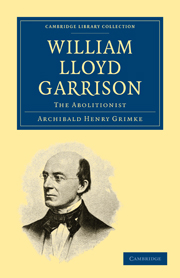Book contents
- Frontmatter
- Preface
- Contents
- CHAPTER I The Father of the Man
- CHAPTER II The Man Hears a Voice: Samuel, Samuel!
- CHAPTER III The Man Begins his Ministry
- CHAPTER IV The Hour and the Man
- CHAPTER V The Day of Small Things
- CHAPTER VI The Heavy World is Moved
- CHAPTER VII Master Strokes
- CHAPTER VIII Colorphobia
- CHAPTER IX Agitation and Repression
- CHAPTER X Between the Acts
- CHAPTER XI Mischief Let Loose
- CHAPTER XII Flotsam and Jetsam
- CHAPTER XIII The Barometer Continues to Fall
- CHAPTER XIV Brotherly Love Fails, and Ideas Abound
- CHAPTER XV Random Shots
- CHAPTER XVI The Pioneer Makes a New and Startling Departure
- CHAPTER XVII As in a Looking Glass
- CHAPTER XVIII The Turning of a Long Lane
- CHAPTER XIX Face to Face
- CHAPTER XX The Death-Grapple
- CHAPTER XXI The Last
- Index
CHAPTER XIX - Face to Face
Published online by Cambridge University Press: 05 February 2012
- Frontmatter
- Preface
- Contents
- CHAPTER I The Father of the Man
- CHAPTER II The Man Hears a Voice: Samuel, Samuel!
- CHAPTER III The Man Begins his Ministry
- CHAPTER IV The Hour and the Man
- CHAPTER V The Day of Small Things
- CHAPTER VI The Heavy World is Moved
- CHAPTER VII Master Strokes
- CHAPTER VIII Colorphobia
- CHAPTER IX Agitation and Repression
- CHAPTER X Between the Acts
- CHAPTER XI Mischief Let Loose
- CHAPTER XII Flotsam and Jetsam
- CHAPTER XIII The Barometer Continues to Fall
- CHAPTER XIV Brotherly Love Fails, and Ideas Abound
- CHAPTER XV Random Shots
- CHAPTER XVI The Pioneer Makes a New and Startling Departure
- CHAPTER XVII As in a Looking Glass
- CHAPTER XVIII The Turning of a Long Lane
- CHAPTER XIX Face to Face
- CHAPTER XX The Death-Grapple
- CHAPTER XXI The Last
- Index
Summary
Face to face at last were freedom and slavery. The final struggle between them for mastery had come. Narrow, indeed, was the issue that divided the combatants, slavery extension on the one side, and slavery restriction on the other, not total and immediate emancipation, but it was none the less vital and supreme to the two enemies. Back of the Southern demand for “More slave soil” stood a solid South, back of the Northern position, “No more slave soil” was rallying a fast uniting North. The political revolution, produced by the Kansas-Nebraska Bill, advanced apace through the free States from Maine to Michigan. A flood-tide of Northern resistance had suddenly risen against the slave-power.
Higher than anywhere else rose this flood-tide in Massachusetts. The judge who remanded Anthony Burns to slavery was removed from office, and a Personal Liberty Law, with provisions as bold as they were thorough, enacted for the protection of fugitive slaves. Mr. Garrison sat beside the President of the State Senate when that body voted to remove Judge Loring from his office. Such was Massachusetts's answer to the abrogation of the Missouri Compromise, and a triumphant slave-power. Its instant effect was to accelerate in the South the action of the disunion working forces there, to hurry the inevitable moment when the two sections would rush together in a death-grapple within or without Webster's once glorious Union.
- Type
- Chapter
- Information
- William Lloyd GarrisonThe Abolitionist, pp. 356 - 369Publisher: Cambridge University PressPrint publication year: 2010First published in: 1891



